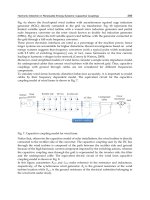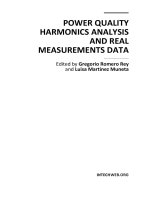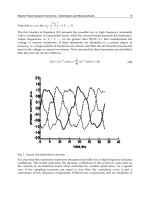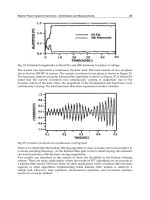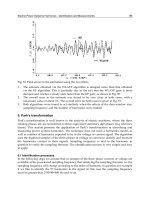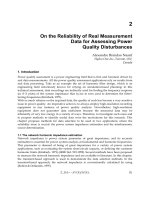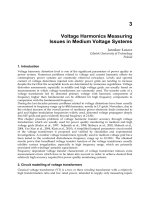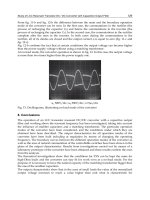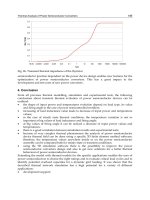Power Quality Monitoring Analysis and Enhancement Part 16 docx
Bạn đang xem bản rút gọn của tài liệu. Xem và tải ngay bản đầy đủ của tài liệu tại đây (213.87 KB, 3 trang )
Power Quality – Monitoring, Analysis and Enhancement
362
Fig. 13. Network after restoration for case 1
Based on the proposed procedure, negotiation rules, and preset LAs priority list, NA first
creates the un-served set (LA7, LA8) and chooses LA8 as first LA to be restored. LA8 then
sends restoration request to its Bus Agent BA4. Since the fault is still there, BA4 will send a
refuse message to LA8. Thus LA8 tries to restore power from BA3. With 0 available
capacities, BA3 first negotiates with its connected neighbor BA2 for more power capacity.
Because available capacity of BA2 (10.0) is greater then the request capacity (5.0), BA2 will
transfer 5.0 to LA8 through BA3. Once LA8 obtains sufficient power, it will send a
message to NA. NA then deletes LA 8 from un-served set. Next, LA7 can also be restored
similarly. The communication path is LA7BA3BA2. The new network is shown in
Figure 13.
2.6.5.2 Case 2: Partial restoration for fault on generator
This case will show partial restoration where the amount of available power falls short of
the sum of un-served loads. Now the fault happed in one synchronous generator, the system
then lost one of its major power sources. Figure 14 shows the post fault network. Shaded
area has lost power.
Like in case 1, the NA first creates un-served set (LA1, LA3, LA5, LA7, LA8). Based on
preset priority list, LA5 is selected to be first resorted. Through negotiation path
LA5BA1BA3BA2, system can not restore LA5 for insufficient available capacity (10 <
37). Next, LA8 begins the restoration procedure by path LA8BA4BA2. After LA8
restoration, LA3 can be restored by path LA3BA1 BA4BA2. Later, LA1 and LA7 fail to
obtain power.
The amount of available power is only 10. As the total amount of un-served loads is 54, the
available power is insufficient to restore all the loads. Although three loads (LA1, LA5, LA7)
are unfortunately disconnected as shown in the Figure 15, this is the optimal solution under
these conditions.
Intelligent Techniques and Evolutionary Algorithms
for Power Quality Enhancement in Electric Power Distribution Systems
363
Fig. 14. Post fault network for case 2
Fig. 15. Network after restoration for case 2
This section provides a multi-agent-based approach for navy ship system electric power
restoration. The proposed system composed of three different agents. By negotiating among
agents, without a control center, the system can perform restoration work by local
information. Several test cases have been simulated for the presented method and proved to
be successful. Since the whole approach is derived from a simplified ship system structure,
the future work of this research will study more complex system structure. Agents control
for synchronous generator, propulsion induction motor, and power inverter will be
considered.
Power Quality – Monitoring, Analysis and Enhancement
364
3. References
Ashish Ahuja, Sanjoy Das, and Anil Pahwa, Fellow, IEEE, 2007, An AIS-ACO Hybrid
Approach for Multi-Objective Distribution System Reconfiguration, IEEE
transactions on power systems, vol. 22, no. 3, pp. 1101-1111.
B. Venkatesh, Rakesh Ranjan, 2000, Optimal radial distribution system reconfiguration
using fuzzy adaptation of evolutionary programming, IEEE transactions on power
systems, vol. 15, no. 3.
D.P. Kothari, I.J.Nagrath. 2007. Power System Engineering, Second Edition. Tata McGraw-
Hill Publishing Company Limited. ISBN: 0070647917, 9780070647916, New Delhi.
D.P. Kothari, I.J.Nagrath. 2008. Modern Power System Analysis, Third Edition, McGraw-
Hill Publishing Company Limited. ISBN: 0070494894, 9780070494893, New York.
D.P. Kothari, J.S.Dhillon. 2004. Power System Optimisation, Prentice Hall of India Private
Limited. ISBN: 8120321979, 9788120321977 , New Delhi.
Dong Zhang, Zhengcai Fu, Liuchun Zhang, 2007, An improved TS algorithm for loss-
minimum reconfiguration in large-scale distribution systems, Electric Power Systems
Research, Volume 77.
Dr. Paramasivam Venkatesh Ramachandran Gnanadass, Dr. Narayana Prasad Padhy, 2004.
Available Transfer Capability Determination Using Power Transfer Distribution
Factors, The Berkeley Electronic Press.
Elgerd Olle I. 1983. Electrical energy system theory- An introduction, Second Edition. Tata
McGraw-Hill Publishing Company Limited. ISBN-13: 978-0070992863, New Delhi.
Ghiani E., Member IEEE, Mocci S., Member, IEEE, and Pilo F., Member, IEEE, Optimal
Reconfiguration of Distribution Networks According to the Micro grid Paradigm.
Momoh James A., Feng Julan, 2009, A Multi-Agent-Based Restoration Approach for Navy
Ship Power System, 6
th
International Conference on Power Systems Operation and
Planning, May 22-26, 2005, Cape Verde, pp.98-102, vol-1.
Mukwanga W. Siti, Dan Valentin Nicolae, Adisa A. Jimoh, Member, IEEE, and Abhisek
Ukil, 2007, Reconfiguration and Load balancing in the LV and MV Distribution Networks
for Optimal Performance IEEE transactions on power delivery, vol. 22, no. 4, pp. 1128-
1135.
Nagata T., Sasaki H., and Yokoyama R., 1995, Power system restoration by joint usage of
expert system and mathematical programming approach, IEEE Transactions on
Power Systems, vol. 10, pp. 1473-1479.
Rong-fu Sun, Yue Fan, Yong-hua Song, Senior Member, IEEE, Yuan-zhang Sun, Senior
Member, IEEE, 2006, Development and Application of Software for ATC
Calculation, Electric Power Systems Research, Volume 76.
Salazar Harold, Student Member, Gallego Ramón, and Romero Rubén, Member, IEEE, 2006,
Artificial Neural Networks and Clustering Techniques Applied in the Reconfiguration
of Distribution Systems, IEEE transactions on power delivery, vol. 21, no. 3.
Sivanagaraju, S., Visali, N., Sankar, V., Ramana,T , 2005, Enhancing voltage stability of radial
distribution systems by network reconfiguration, Electric Power Components and
Systems Vol.33 (5) pp. 539-550.
Verbi’c Gregor, Pantoˇs Miloˇs, Gubina Ferdinand, 2006. On voltage collapse and apparent-
power losses, Electric Power Systems Research, Volume 76.
Wu J. S., Liu C. C., Liou K. L., and Chu R. F., 1997, A petri net algorithm for scheduling of
generic restoration actions, IEEE Transactions on Power Systems, vol. 12, pp. 69-76.
